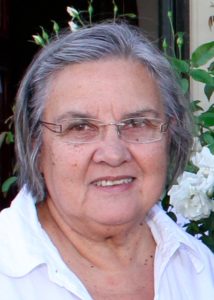Flinders University’s December graduation ceremonies today (December 17) will see more than 550 graduating students receive their degrees at the Adelaide Convention Centre, and honorary doctorates awarded to Aboriginal health pioneer and advocate Ms Pat Anderson (pictured) and to the Vice-Chancellor of the University of New England, Professor James Barber.
The University will be awarding degrees to its first cohort of Master of Occupational Therapy graduates and for the first time medical graduates will qualify with an MD – Doctor of Medicine – rather than a Bachelor of Medicine/Bachelor of Surgery (BMBS).
Receiving a degree of Doctor of the University (DUniv), Ms Pat Anderson is an Alyawarre woman from the Northern Territory with a national and international reputation as a powerful advocate for disadvantaged people, with a particular focus on the health of Australia’s First Peoples. Chair of the Lowitja Institute, she has extensive experience in all aspects of Aboriginal health, including community development, advocacy, policy formation and research ethics, and has had a close association with Flinders University for many years.
After growing up on Parap Camp in Darwin, Ms Anderson travelled and worked overseas before working for the Woodward Royal Commission into Aboriginal Land Rights (1973-74) as a legal secretary. She then became one of the first Aboriginal graduates of the University of Western Australia.
After working in Tasmania, Western Australia and Victoria as an advocate for improved education for Aboriginal children, she returned to the Northern Territory in the early 1990s to become CEO of Danila Dilba Aboriginal Health Service. This led to the start of her involvement with Flinders, supporting the placement of medical students based at the University’s Darwin Clinical School.
She played a key role in establishing the Aboriginal Medical Service Alliance of the Northern Territory (AMSANT), the representative body for the Aboriginal community-controlled health organisations.
After leading the founding of the Cooperative Research Centre (CRC) for Aboriginal and Tropical Health in 1997, she retained a leading role in the successive CRCs that came to constitute the core of the newly created Lowitja Institute, in which Flinders is a partner. The Lowitja Institute, now recognised as Australia’s National Institute for Aboriginal and Torres Strait Islander Health Research, received an additional $25 million in research funding from the 2013 Federal Budget.
Author of numerous essays, papers and articles, Ms Anderson was co-author with Mr Rex Wild QC of Little Children Are Sacred, a highly influential report on abuse of Aboriginal children in the NT.
Professor James Barber, who receives a degree of Doctor of the University (DUniv), has made major contributions to the field of social work and to Flinders through teaching, research and community engagement.
An honours arts graduate of Flinders in 1981 and a PhD in Experimental Psychology at the University of Adelaide Professor James Barber undertook research in the applied fields of drug addiction and child welfare.
Appointed to chairs in Social Work at La Trobe University and the University of Tasmania, he returned to Flinders as Professor of Social Administration. At Flinders he codirected the Australian Institute for Community Services Research with Mr John Roffe, then CEO of Anglicare, and also established a Masters of Social Work (MSW), the first and highly influential Masters level degree in Social Work introduced in Australia.
From 2003 to 2005 Professor Barber was Dean, Faculty of Social Work at the University of Toronto, and then Deputy Vice-Chancellor (Academic) to the Royal Melbourne Institute of Technology (RMIT) University, where he was also interim President of RMIT International University of Vietnam.
In addition to this international experience, his work in regional universities has made him an advocate of their important contribution to the education, prosperity and identity of their regions.
Awarded the Pro Humanitate Medal for his research in child welfare, his international research reputation includes six books and more than one hundred journal articles. He became Vice-Chancellor of the University of New England in 2010.


